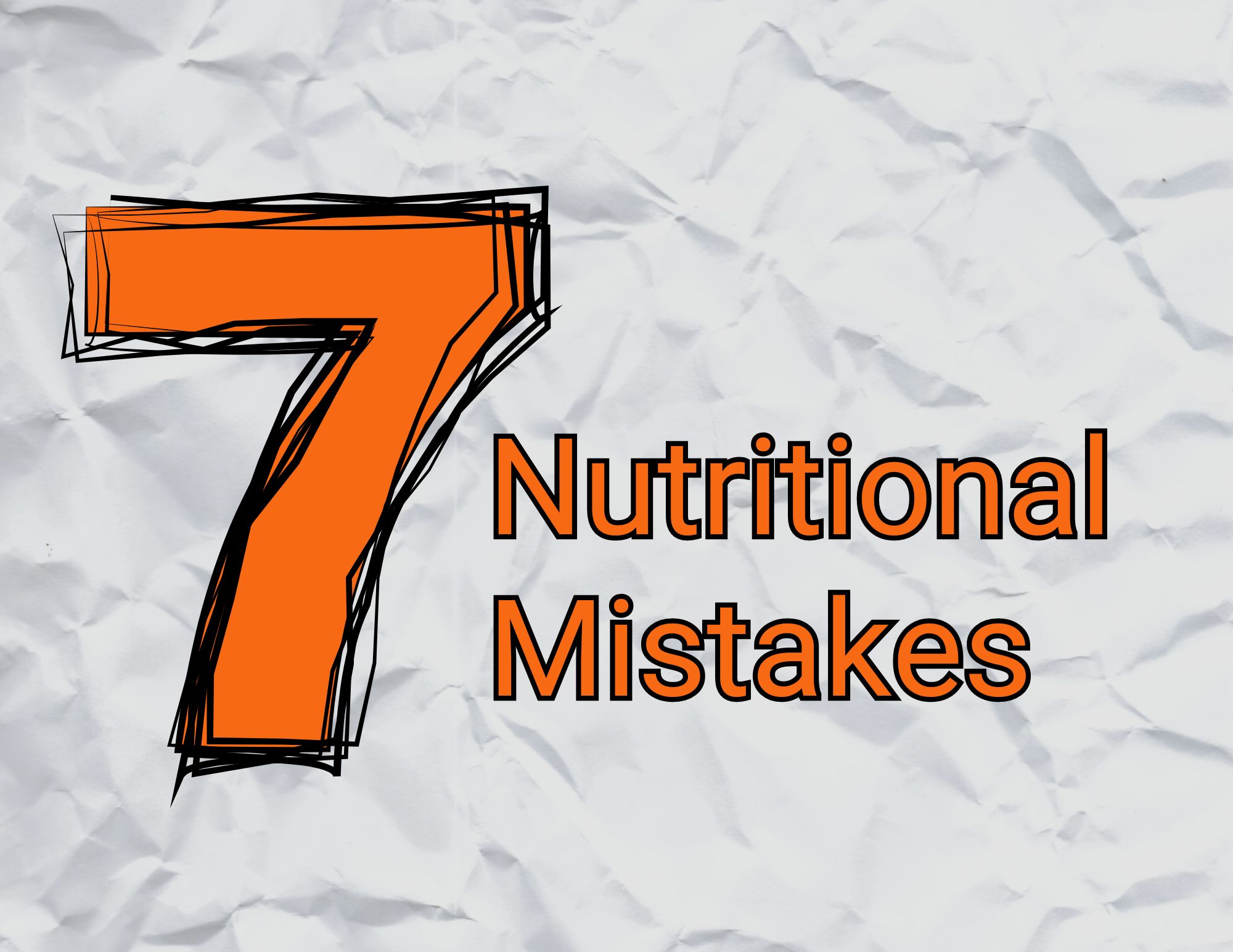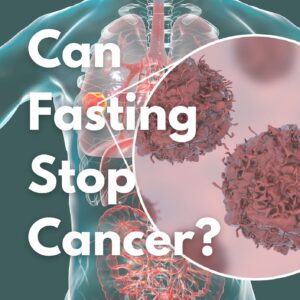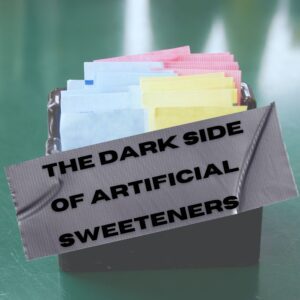Mistake No. 1: Consuming excessive sugars
Excess sugar consumption can be described as the root of many modern-day diseases.
Sugar, by definition, is a high glycemic index carbohydrate. This means that once it enters the gut, it immediately crosses the bowel lining and enters the bloodstream, causing a rapid rise in blood sugar. In response, the pancreas secretes insulin, and the sugar (glucose) is shuttled into the cells for use as energy. The sugar molecules are released into the bloodstream so quickly that they damage the arterial walls, causing inflammation.
Eating simple carbohydrates shuts off fat burning by spiking insulin levels and turning on fat production. Insulin is the “fat storage hormone”. We recommend limiting simple carbs such as: bread, pasta, cookies, candy, and one of the worst culprits, liquid calories (ie. sugary sodas). At Fast.Eat.Live. we suggest only consuming simple carbs in moderation on specific days of the week, which we call our “Live” days.
These types of simple carbs increase inflammation and lead to accelerated aging. The glycemic index (GI) is a rating system for carbohydrates that indicates how quickly they cause a spike in blood sugar (glucose). It’s helpful to learn which carbohydrates are more beneficial and which ones are best to avoid.
Low-GI foods will keep you in a fat-burning state indefinitely by maintaining low insulin levels. Our ancestors lived in a more harmonious state of blood sugar balance because they didn’t have access to modern-day processed foods and those overloaded with sugar.
Some high-GI foods include those simple-carb foods listed above. Low-GI foods include: fruits, unrefined grains, and non-starchy vegetables.
Mistake No. 2: Neglecting portion control
Eating portions that are too large can lead to overeating and daily caloric surplus. Therefore, it’s critical to know how many calories you should eat in a day, and what that looks like for portion size. When first working with our clients we give visual examples of portion sizes, and the proper macronutrient ratios. This is important in laying the groundwork for health. Portion sizes at restaurants can be very misleading, and most people do not know how much they should be consuming. A nutrition coach can help with this.
We suggest a few simple tips: Refrain from eating after 8pm. Stop eating before you feel full. Chew your food slowly. By slowing down your eating, your brain will have ample time to sense that your stomach is distended and generate a satiety signal.
Feasts are ideally meant to be enjoyed with people you care about. Imagine ancient tribes eating together after a big hunt or gather, or families eating together at the end of the day. These events coupled together with good food knowledge and habits are the bedrock of our nutrition system at Fast.Eat.Live.
Mistake No. 3: Not eating enough protein
Most people are surprised to learn that they are not eating nearly enough protein. The multi-billion dollar food industry has us hooked on snacking high-carb, high-sugar foods. It’s always easy to find quick carbohydrates to eat, but we must understand that protein is king! We coach our clients that your diet should be built around protein.
If you don’t consume enough protein during the day, you will likely lose muscle, which is responsible for burning fat. Muscle t is your horsepower! It is the organ of longevity. The more muscle you maintain as you age, the longer you live!
Muscle also serves as a protein storage. During times of stress or illness, the body can draw amino acids from muscle, form antibodies, and fend off offending pathogens. These amino acids can also be used to repair injured tissues. We recommend eating at least 1 gram of protein per pound of bodyweight daily — especially for those individuals who make strength training a part of their routine.
Vegans and Vegetarians need to make an extra effort to prioritize the amount of protein consumed. Nutrients in vegetables aren’t as “bioavailable” or broken down in the body as efficiently as animal proteins are.
For more detailed information about why your body needs protein, and the best sources, refer to the blog post titled “Protein=Life” on the Fasteatlive.com website.
Mistake No. 4: Avoiding fat
There’s a common misconception that fat is bad. During the 1980’s and 90’s we were fed misinformation that saturated fat led to heart disease. This is false and dangerous for your health. Every animal is made of saturated fat, and even vegetables have it. Although, this is rarely reported.
Only fat in the presence of high insulin levels (from consumption of simple carbohydrates) is bad for you. Carbohydrates fried in unhealthy fats (man-made oils) do have a negative impact on your heart. The menu offerings at a typical sports bar or fast food joint (ie. French fries, onion rings, and chicken fingers) would fit into this category.
Eating fat with protein or with low glycemic index carbohydrates keeps insulin levels low. Therefore, it does not turn off fat burning. In fact, it encourages your body to continue burning fat. Refer to the blog post on Fasteatlive.com: “Does Eating Fat make You Fat?” for further clarification on this topic.
Fats like omega-3 and omega-9 are important for reducing inflammation and combating the free radicals that can damage cell walls and accelerate the aging process. Eating fats also induces a satiety signal and reduces the tendency to overeat. Combine fats with protein or with a low glycemic index carbohydrate in your meals when possible. For example, pair a steak (protein and fat) with broccoli (a low-GI carbohydrate), and skip the mashed potatoes.
Ideally, choose anti-inflammatory fats such as omega-3 (from cold freshwater fish) or omega-9 (olive oil).
Mistake No. 5: Not consuming enough fruits & vegetables
Most Americans are guilty of not eating enough vegetables. However, produce is abundant in vitamins and minerals, which we need for our bodies to work optimally. Vegetables are an excellent source of fiber, promoting gastrointestinal health and creating an environment for a healthy gut microbiome. Fiber also helps us process food through our system with regular bowel movements, removing waste and toxins. This is critical for lowering inflammation in our bodies. The quicker we can remove toxins, the greater chance we have of lowering the risk of bowel disease.
Eating fiber helps us to feel full, which reduces the likelihood of overeating. Fiber also slows the rate that sugar is absorbed into the bloodstream, so it lowers the glycemic index of the foods we eat.
When choosing vegetables, we recommended a variety of fibrous leafy greens, broccoli, cucumber, cauliflower, squash, and more. If you don’t enjoy eating a lot of vegetables, you should consider supplementing with a superfood green powder blended product. There are several high-quality options available now, like Enso Superfoods, Beyond Greens, or Garden of Life. Reach out to us at Fast.Eat.Live. for further product recommendations to suit your taste and needs.
Mistake No. 6: Not drinking enough water
Adequate water consumption is often overlooked, particularly in older individuals, as thirst responses can be diminished with age. From our coaching experience we see most clients are typically in a state of dehydration, and they don’t even realize it. It’s often the first correction action we prescribe for better overall health. It’s simple and basically free.
In his neurosurgery practice, Dr. Brett Osborn (a board-certified neurosurgeon in West Palm Beach, Florida) said he “often treats seniors who have sustained falls and bled into their brains, largely due to a combination of dehydration and overmedication, leading to low blood pressure and fainting”. This can be very problematic, because dehydration predisposes one to falls, the most common cause of traumatic brain injury.
To prevent the dangerous effects of dehydration, the doctor advised striving for one gallon of electrolyte-laden water daily. A simple way to get electrolytes in is to add powdered electrolyte packets into your water. There are several brands on the market these days like Liquid IV, Nuun, or LMNT. We recommend those that are sugar-free and higher in sodium content. Drinking water solely, may contribute to an imbalanced blood pressure, which could cause the body to remove critical electrolytes needed, as they are excreted through urination.
Mistake No. 7: Eating late at night
In coaching hundreds of clients through our Fast.Eat.Live., system, we’ve found that many people are prone to eat smaller amounts and fewer calories during the day, and then consequently make a habit of binge-eat at night. A hectic day can make them feel too busy to eat, and when finally home and relaxing, may overindulge. This can easily happen while sitting in front of the TV, mindlessly munching, or rewarding themselves with snacks and “junk food”.
Our bodies work on a bio-rhythmic circadian system. A few hours before bedtime the hormone melatonin kicks in to help us fall asleep. If we consume calories after that, this natural process is interrupted. Hormonally our bodies will convert those excess calories to fat and long-term storage. Planning your day in advance and having good back up plans in place is the key to staying on track with your eating. It’s critical to understand how many calories you require daily, and then choose whole foods to get the essential nutrients you need. We recommend you eat a high protein, moderate fat, and low-glycemic, anti-inflammatory diet. The more protein and fat you eat, the more satiated you’ll be and avoid binge eating!




